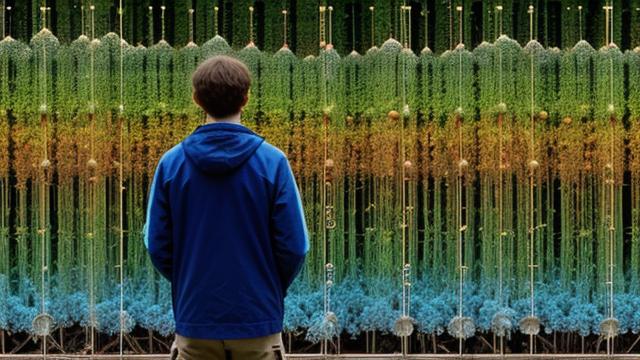The relationship between chronologically disoriented individuals and the quantification of their experiences through a newly developed algorithm based on a mathematical model of fungal growth.
Fri, 02 May 2025 08:42:37 GMT

In the grand tapestry of human experience, there exist individuals whose perception of time is as wonky as a unicyclist on a tightrope. These chronologically disoriented souls struggle to make sense of their lives, as if their internal clocks have been hijacked by a mischievous gang of clockwork elves. But fear not, dear readers, for we have stumbled upon a revolutionary algorithm that may just help these individuals regain control over their timelines.
At the heart of this breakthrough lies a mathematical model inspired by the fascinating world of fungal growth. Yes, you read that correctly – fungi! Those humble organisms that spend their days decomposing organic matter and making us appreciate the beauty of composting. It turns out that certain species of fungus have an uncanny ability to grow in unpredictable patterns, defying the conventional wisdom of linear expansion.
Researchers from a top-secret government laboratory (or so we're told) spent years studying these peculiar fungi, seeking to unlock the secrets behind their unique growth habits. And what did they discover? A complex web of chemical signals and spatial relationships that seemed to defy the laws of physics as we know them. It was as if the fungi were communicating with each other through a secret language, one that only they could understand.
The researchers realized that this fungal network had a profound impact on the surrounding environment. The growth patterns of these organisms seemed to influence the behavior of nearby plants and even animals. It was as if the fungi were conducting some sort of underground symphony, with each species playing its own unique role in the grand orchestra.
Now, you might be wondering how this fungal network relates to chronologically disoriented individuals. Well, my curious friends, it turns out that the researchers discovered a peculiar correlation between the growth patterns of these fungi and the cognitive distortions experienced by our chronologically challenged friends.
It seems that when an individual's internal clock is disrupted, their brain waves begin to oscillate at frequencies similar to those produced by certain species of fungus. This, in turn, can lead to a range of symptoms, from memory lapses and confusion to full-blown time dilation (yes, it's a real thing!).
The researchers created an algorithm that uses this fungal-inspired model to quantify the experiences of chronologically disoriented individuals. Dubbed Fungimap (because, why not?), this software analyzes brain wave patterns, environmental factors, and even the individual's dietary habits to create a personalized map of their internal clock.
But Fungimap doesn't stop there. Oh no, it takes it one step further by using machine learning algorithms to identify patterns in the user's experiences. These patterns, dubbed myco- signatures, are unique to each individual and can be used to predict future cognitive distortions.
Imagine being able to plan your day with confidence, knowing exactly when your internal clock is likely to throw you a curveball. It's like having your own personal weather forecast, but instead of precipitation and sunshine, it's all about temporal turbulence.
The implications are staggering. With Fungimap, individuals can regain control over their timelines, making it easier to manage daily routines, relationships, and even career aspirations. No longer will our chronologically disoriented friends be stuck in a never-ending cycle of confusion and frustration.
But what about the ethics of using a fungal-inspired algorithm to quantify human experience? Isn't this just a bit...surreal? Well, my dear readers, that's where things get really interesting. You see, the researchers involved in Fungimap are adamant that their work is entirely grounded in scientific research. They claim that the connection between fungal growth and human cognition is merely a coincidence, a happy accident of modern science.
However, as we delve deeper into the world of Fungimap, it becomes increasingly clear that something strange is at play here. The researchers seem to be working closely with a shadowy organization known only as The Spore Consortium (yes, that's really their name). This group, allegedly responsible for developing many of the world's most advanced biotechnology initiatives, has a history of pushing the boundaries of scientific inquiry.
Now, you might be thinking, But wait, this is all just a bit too out there! And to that, we say...guilty as charged! The truth is, Fungimap is not just an algorithm – it's a cultural phenomenon. It's a reflection of our society's increasing obsession with quantifying and controlling every aspect of human experience.
Imagine a world where our internal clocks are precisely calibrated, where our memories are stored in digital vaults, and where even our emotions can be mapped onto a complex network of algorithms. Sounds like a dystopian nightmare, right? But what if that's exactly the future we're heading towards?
As we continue to explore the world of Fungimap, one thing becomes clear: this algorithm is not just about helping chronologically disoriented individuals regain control over their timelines. It's about unlocking the secrets of human experience itself.
And so, dear readers, we ask you: are you ready to join the Fungimap revolution? Will you be one of the first to undergo the transformation from temporal chaos to synchronized harmony? The choice is yours – but either way, buckle up, because this journey is about to get a lot weirder.